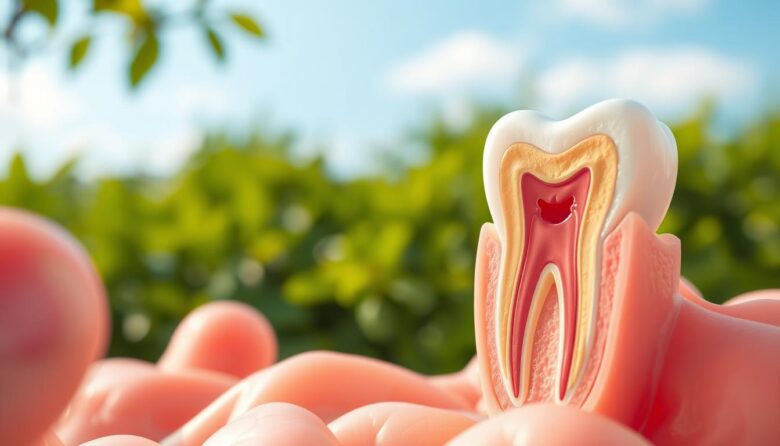Healthy gums are key to good oral health and help prevent gum disease. To boost gum health, simple daily habits can make a big difference. Good oral hygiene, like brushing and flossing, is crucial for a healthy smile and gums.
This article will show you easy ways to add these habits to your daily life. Everyone can follow these steps to improve their gum health.
Understanding Gum Health
Gum health is about the condition of the tissues around and supporting the teeth. Healthy gums are firm, pale pink, and don’t bleed when brushing. It’s key to keep these traits for good oral care.
What is Gum Health?
Gum health is crucial for dental hygiene. Gums protect against harmful bacteria and diseases. Healthy gums shield the teeth roots and bones, creating a strong base for each tooth.
Importance of Healthy Gums
Healthy gums are essential for tooth protection and disease prevention. They prevent gingivitis and periodontitis. Gum health is linked to overall health, showing the importance of oral care.
Poor gum health can cause heart disease and diabetes issues. By focusing on gum health, you can improve your life and avoid health problems from bad oral hygiene.
Common Causes of Gum Disease
Knowing what causes gum disease is key to preventing it. Many factors can lead to this issue, which can cause serious problems if not treated early.
Bacterial Infections
Bacteria are a big part of gum disease. They come from plaque, which irritates the gums. When plaque turns into tartar, it makes inflammation worse. Keeping your mouth clean is important to fight off these infections.
Hormonal Changes
Hormonal shifts can affect gum health, especially in women. Changes during puberty, menstruation, pregnancy, and menopause make gums more sensitive. This sensitivity can lead to inflammation and infection, increasing the risk of gum disease. Knowing this can help people take steps to prevent gum disease.
Tobacco Use
Tobacco harms gum health and increases the risk of oral diseases. Smokers and chewers are more likely to get gum disease than non-users. Tobacco also slows down healing, making gum problems harder to fix. Understanding tobacco’s harm can encourage healthier choices.
Daily Habits for Better Gum Health
Creating daily habits is key for good gum health. By following effective oral hygiene practices, gums stay healthy and disease-free. Simple steps can greatly improve your dental health.
Brushing Techniques
Choosing the right brushing techniques is important for gum health. Use a soft-bristled toothbrush to avoid gum damage. Brush in gentle circular motions for two minutes, making sure to clean all tooth surfaces.
Practicing these techniques regularly boosts your oral hygiene routine’s effectiveness.
Flossing Importance
Flossing is crucial for good oral hygiene. It removes plaque and debris from between teeth, where toothbrushes can’t reach. Many people forget this step, but flossing daily is key for gum health.
Adding flossing to your daily routine can improve gum health and lower gum disease risk.
Rinsing with Antiseptic Mouthwash
Antiseptic mouthwashes are another way to support gum health. They kill bacteria, reduce inflammation, and freshen breath. Daily rinsing with an antiseptic mouthwash adds to brushing and flossing, making a complete gum health plan.
By following these gum health tips, you’ll see a healthier smile over time.
Nutritional Choices for Gum Health
Diet is key to keeping gums healthy. Making smart food choices can greatly improve your oral health. Adding certain foods to your diet can be very effective in boosting gum health.
Foods to Incorporate
It’s important to eat foods rich in nutrients for healthy gums. Here are some good options:
- Citrus fruits, such as oranges and grapefruits, provide vitamin C, which helps to strengthen gum tissue.
- Leafy greens, like spinach and kale, are high in antioxidants that combat inflammation.
- Fatty fish, including salmon and mackerel, contain omega-3 fatty acids that have anti-inflammatory properties.
- Nuts, particularly almonds and walnuts, are a good source of vitamin E and healthy fats that support gum health.
Foods to Avoid
Some foods can harm your gums and should be eaten less or not at all. Here are foods to limit:
- Sugary snacks, such as candies and cookies, can lead to plaque buildup and gum disease.
- Sodas and acidic beverages increase the risk of tooth decay and gum inflammation.
- Processed foods high in refined carbohydrates can contribute to oral health issues.
Regular Dental Check-ups
Keeping your gums healthy needs regular care. Going to the dentist often is key. These visits help prevent gum disease through cleanings and checks.
Importance of Professional Cleanings
At dental check-ups, experts remove tartar and plaque. These are tough to get rid of with just brushing. This keeps your gums in good shape and lowers gum disease risk.
Dentists give you care that goes beyond what you do at home. They make sure your teeth and gums are well looked after.
Detecting Issues Early
Going to the dentist regularly helps catch gum disease early. Signs like swollen gums or bleeding can be treated before they get worse. Dentists say you should go at least every six months.
This helps find and fix problems early. It’s a big part of preventing gum disease.
Home Remedies for Healthy Gums
Looking into home remedies for healthy gums can be a great way to improve your oral care. Simple steps like saltwater rinses and aloe vera gel can help. They aim to reduce inflammation and support gum health.
Saltwater Rinse
A saltwater rinse is a cost-effective and effective way to tackle gum inflammation and bacteria. Mix salt in warm water and swish it around your mouth. It can help soothe irritation and aid in healing.
Aloe Vera Gel
Aloe vera gel is known for its soothing effects and benefits for oral health. Applying it directly to your gums can promote healing and reduce discomfort. It acts as an anti-inflammatory and protects against oral bacteria, making it a great addition to your gum care routine.
The Role of Hydration
Hydration is key for keeping gums healthy. Drinking enough water keeps the body hydrated and boosts oral health. Water helps saliva work better, which protects gums from acid and food particles.
How Water Benefits Gums
Water helps gums in many ways. It increases saliva, which fights cavities and gum disease. Saliva also has minerals that strengthen teeth and gums, reducing inflammation and infection risks.
Staying hydrated keeps the mouth moist. This prevents dry mouth, which can harm oral health.
Recommended Daily Intake
Drink at least eight 8-ounce glasses of water a day. This “8×8” rule supports oral health. Adjust your intake based on your activity, climate, and health.
Smoking and Its Effects on Gum Health
Smoking harms gum health a lot. It cuts down blood flow to the gums. This makes healing slow and gums more prone to disease. Knowing the dangers of smoking is key for good oral health.
Understanding the Risks
The risks of tobacco use are many. Smokers face:
- More plaque, leading to gum disease.
- Slower healing after dental work.
- Higher risk of losing teeth to gum disease.
- Greater chance of oral cancers.
These points are vital for anyone worried about smoking’s impact on gums.
Strategies for Quitting
Quitting smoking boosts health and gum health. Here are ways to help:
- Get help from healthcare for a plan.
- Try nicotine products like patches or gum.
- Join support groups for help and motivation.
- Set goals and celebrate your progress.
Committing to quit smoking is crucial for better gum health and less risk.
Stress and Gum Health
Stress can really hurt your gums, leading to many oral problems. When we’re stressed, we might grind our teeth or skip brushing our teeth. It’s important to know how stress affects our gums and overall health.
Connection Between Stress and Oral Health
Stress can harm our bodies in many ways. It can make us grind our teeth or clench our jaws, putting too much pressure on our gums. Stress also weakens our immune system, making us more likely to get gum disease. This shows why managing stress is key to keeping our gums healthy.
Stress-Relief Techniques
Using stress-relief methods can help our mental and gum health. Here are some good ways to do it:
- Mindfulness practices: Meditation or deep breathing can help us relax.
- Regular exercise: Exercise lowers stress hormones and boosts happiness.
- Social support: Being with loved ones can make us feel better emotionally.
- Hobbies: Doing things we love can distract us from stress.
Long-term Commitment to Gum Care
Keeping your gums healthy needs a long-term plan. This plan includes daily habits and smart planning. Setting goals is key to a good oral care routine.
By setting goals, you can keep your efforts going strong. This leads to healthier gums over time. Constant care boosts gum health and makes you feel accomplished.
Setting Realistic Goals
Starting a journey to better gum health is exciting. It’s important to break down goals into easy steps. Start with simple habits like brushing twice a day, flossing daily, and using mouthwash.
These small steps help build a strong oral care routine. It keeps you motivated and on track with your gum care goals.
Tracking Progress and Making Adjustments
It’s crucial to track your gum health. Regular self-checks and dental visits give you insights. They show what’s working and what needs improvement.
Based on this feedback, you might change your brushing technique or try new products. Being patient and persistent is key. Long-term effort pays off for your gums.




